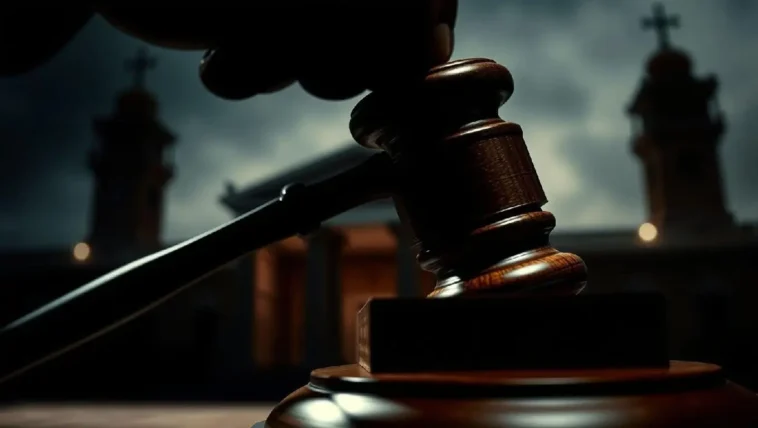Rivers State Emergency
Tinubu Declares Emergency in Rivers State: What You Need to Know
Rivers State Emergency: President Tinubu’s unprecedented move has ignited a firestorm of debate and controversy across Nigeria.Tinubu’s Bold Move: Rivers State Under Emergency Rule – Analyzing the Fallout
The political landscape of Nigeria has been shaken once again. President Bola Ahmed Tinubu, in a move that has sent shockwaves across the nation, has declared a state of emergency in Rivers State. The declaration, made on March 18, 2025, has raised critical questions about the balance of power between the federal and state governments, and the implications for Nigerian democracy.
This is not just another news story; it’s a political earthquake with aftershocks that could reshape the future of one of Nigeria’s most vital states. The decision has been met with a mix of support and condemnation, igniting a fierce debate about its necessity, constitutionality, and potential consequences. Naija NewsBurrow Network is here to dissect this complex situation, providing you with the most comprehensive and unbiased analysis available.
Rivers State Ungovernable? Unpacking Tinubu’s Declaration of Emergency
President Tinubu’s declaration hinged on the claim that Rivers State had become ungovernable. But what does that truly mean? What specific events and conditions led the President to take such drastic action? The official statement cited escalating political and security crises that threatened public order and safety. But was there more to it than meets the eye?
Reports suggest a confluence of factors contributed to the President’s decision. These include a prolonged and bitter feud between the Governor and a powerful political figure, increasing reports of pipeline vandalism impacting the nation’s oil revenue, and an overall breakdown in law and order. The question remains: were these issues insurmountable by the state government, justifying federal intervention?
Critics argue that the declaration was an overreach of federal power, an attempt to stifle dissent and undermine the authority of the state government. Supporters, on the other hand, claim it was a necessary step to prevent further chaos and protect national interests. This is the crux of the debate, and it’s essential to understand the underlying factors to form an informed opinion.
Fubara, Odu, and the Assembly: Who’s Out, and Why?
The most immediate and controversial aspect of the state of emergency is the suspension of key state officials. Governor Siminalayi Fubara, Deputy Governor Prof. Ngozi Odu, and all members of the Rivers State House of Assembly have been relieved of their duties for an initial period of six months. This unprecedented move has sparked outrage and raised serious questions about the democratic process.
The suspension was justified by the President as necessary due to their failure to restore peace and effective governance in the state. However, critics argue that it effectively disenfranchises the people of Rivers State, denying them their right to choose their leaders. This raises a fundamental question: can the federal government suspend elected officials without undermining the very foundations of democracy?
The absence of these key figures creates a power vacuum and throws the state into a state of uncertainty. The implications of this suspension are far-reaching, impacting everything from the day-to-day operations of the government to the long-term political stability of the state. The consequences are dire, and the people of Rivers State are left wondering what the future holds.
Enter Vice Admiral Ibas: The Man in Charge Now
In the wake of the suspensions, President Tinubu appointed Vice Admiral Ibokette Ibas (rtd) as the administrator to oversee the affairs of Rivers State during the emergency period. This move places a retired military officer in charge of a civilian government, raising concerns about the militarization of governance.
Vice Admiral Ibas is tasked with maintaining order and ensuring the continuity of essential government functions. However, his powers are limited. He is not empowered to create new laws, only to issue regulations subject to Federal Executive Council approval. This raises questions about his ability to effectively govern the state and address its complex challenges.
Who is Vice Admiral Ibas, and what are his qualifications for this role? What are his priorities for Rivers State, and how will he navigate the complex political landscape? The answers to these questions will be crucial in determining the success or failure of this emergency intervention. The people of Rivers State are watching closely, hoping for a leader who can bring stability and progress to their troubled state.
Section 305 Explained: The Constitutionality of Tinubu’s Action
The legal basis for President Tinubu’s declaration lies in Section 305 of the 1999 Constitution of the Federal Republic of Nigeria (as amended). This section allows the president to declare a state of emergency in situations of grave danger, disaster, or breakdown of public order, especially when state authorities are unable or unwilling to act.
However, the constitutionality of the President’s actions is being hotly debated by legal experts and political analysts. Some argue that the situation in Rivers State did not meet the threshold for a state of emergency, and that the President’s actions were a violation of the constitution. Others maintain that the President acted within his constitutional powers, given the extraordinary circumstances.
The interpretation of Section 305 is crucial to understanding the legality of the state of emergency. Was the situation in Rivers State truly a “grave danger” or “breakdown of public order? Were state authorities genuinely “unable or unwilling to act”? These are the questions that legal experts are grappling with, and the answers will have significant implications for the future of Nigerian federalism.
Oil, Politics, and Pipelines: The Economic Stakes in Rivers State
Rivers State is not just another state in Nigeria; it is a major oil-producing region, contributing significantly to the nation’s economy. The state of emergency has significant implications for the oil industry, raising concerns about potential disruptions to production and revenue.
The immediate trigger for the declaration included reports of pipeline vandalization by militants, ongoing political infighting, and the inability of the state government to address these threats. These factors posed a direct threat to national economic interests and energy infrastructure, prompting the federal government to act.
The economic stakes in Rivers State are high, and the state of emergency could have far-reaching consequences for the nation’s economy. The stability of the oil industry is crucial to Nigeria’s financial well-being, and the federal government is determined to protect its interests. However, the question remains: at what cost?
Wike vs. Fubara: How a Political Feud Led to a State of Emergency
The crisis in Rivers State has been brewing for months, fueled by a prolonged and bitter feud between Governor Siminalayi Fubara and the Minister of the Federal Capital Territory, Nyesom Wike. This power struggle has paralyzed the state government and created an atmosphere of instability and uncertainty.
The feud between Wike and Fubara is not just a personal matter; it’s a battle for control of the state’s political structure. Wike, a former governor of Rivers State, is widely seen as a powerful political godfather, seeking to maintain his influence over the state government. Fubara, on the other hand, is trying to assert his independence and break free from Wike’s control.
This power struggle has led to legislative paralysis, mass protests by civil servants, and the demolition of the House of Assembly complex in 2023, which was never rebuilt. The political feud has created a climate of fear and intimidation, making it difficult for the state government to function effectively. The state of emergency is, in many ways, a direct result of this protracted political battle.
Beyond Mediation: Why Tinubu Decided to Intervene Directly
President Tinubu stated that he had previously attempted to mediate between the conflicting parties in Rivers State, but his efforts were disregarded. The lack of cooperation from both the governor and the House of Assembly was cited as a key reason for federal intervention. But why did mediation fail, and what led Tinubu to conclude that direct intervention was necessary?
Some analysts suggest that the deep-seated animosity between Wike and Fubara made mediation impossible. Others believe that the President’s mediation efforts were not genuine, and that he was simply paving the way for federal intervention. Whatever the reason, the failure of mediation paved the way for the declaration of a state of emergency.
The decision to intervene directly was a gamble, with potentially significant consequences. It was a recognition that the situation in Rivers State was beyond the reach of diplomacy and required a more forceful approach. But was it the right decision? Only time will tell.
National Assembly’s Green Light: A Rare Show of Unity?
In a rare show of unity, the National Assembly endorsed President Tinubu’s declaration of a state of emergency in Rivers State. This endorsement is significant, as it demonstrates a broad consensus among Nigeria’s political elite that the situation in Rivers State was dire and required drastic action.
However, the National Assembly’s endorsement was not without controversy. Some lawmakers expressed concerns about the implications of suspending elected officials and the potential for federal overreach. Others argued that the situation in Rivers State was so serious that it justified extraordinary measures.
The National Assembly’s endorsement provides a degree of legitimacy to the state of emergency. It signals that the federal government has the backing of the legislative branch, strengthening its position in the face of criticism. However, it also raises questions about the independence of the National Assembly and its willingness to challenge the President’s authority.
Six Months and Beyond: What’s Next for Rivers State?
The initial period for the state of emergency and suspensions is set at six months, with the possibility of review or extension depending on the situation’s evolution and the restoration of peace and order. But what happens after six months? What are the potential long-term consequences of this intervention?
The federal government has indicated that the restoration of peace, order, and effective governance are prerequisites for lifting the state of emergency and reinstating the suspended officials. However, the process and timeline for this transition remain subjects of ongoing discussion and scrutiny.
The future of Rivers State is uncertain. The state of emergency could lead to a period of stability and progress, or it could exacerbate existing tensions and create new challenges. The key will be the ability of the interim administrator to govern effectively and build trust with the people of Rivers State. The stakes are high, and the future of the state hangs in the balance.
Echoes of the Past: Comparing Rivers State to Previous Emergency Declarations
The declaration of a state of emergency in Rivers State is not unprecedented in Nigerian history. Previous states of emergency have been declared in Borno, Yobe, and Adamawa states during the Boko Haram insurgency. Comparing these situations can provide valuable insights into the potential consequences of the current intervention.
The states of emergency declared during the Boko Haram insurgency were aimed at combating terrorism and restoring order in the affected regions. However, they also led to human rights abuses and a curtailment of civil liberties. These experiences serve as a cautionary tale, highlighting the potential dangers of emergency rule.
The situation in Rivers State is different from the Boko Haram insurgency, but there are still lessons to be learned. The federal government must ensure that the state of emergency is implemented in a way that respects human rights and protects civil liberties. It must also work to address the underlying causes of the crisis, rather than simply imposing a temporary fix.
The declaration of a state of emergency in Rivers State is a complex and controversial decision with far-reaching implications. It is a gamble with the potential to either stabilize the state and promote progress, or to exacerbate existing tensions and create new challenges. Only time will tell whether President Tinubu’s bold move will pay off. Naija NewsBurrow Network will continue to provide you with the most comprehensive and unbiased coverage of this developing story, ensuring you stay informed and engaged.
What do you think about the state of emergency in Rivers State? Share your thoughts and opinions in the comments below.
By Aisha Khan (@AishaKNews) – Naija NewsBurrow Network
The unfolding events in Rivers State are a stark reminder of the complexities and challenges facing Nigerian politics. From the constitutional debates to the economic implications and the human impact, the state of emergency has ignited conversations across the nation. It’s a time for reflection, analysis, and a deeper understanding of the forces shaping Nigeria’s future. As citizens, it’s crucial to stay informed, engage in meaningful dialogue, and explore the different facets of this evolving narrative.
Interested in delving further into the intricacies of Nigerian politics? Want to better understand the key players, the historical context, and the potential outcomes of events like the Rivers State emergency? We’ve curated a selection of insightful resources that can help you expand your knowledge and engage more deeply with the issues that matter most. Explore our recommended books, documentaries, and expert analyses to gain a comprehensive perspective on Nigerian politics and its impact on the nation. Don’t forget to leave your comments below and subscribe to the Naija NewsBurrow newsletter for the latest updates and in-depth analysis.
Shop Products On Amazon
Shop Products on Ebay









Trending Similar Stories in the News
Nigeria’s oil-rich Rivers State under emergency: sending in the army isn’t the answer The Conversation...
Rivers state crisis: President Bola Tinubu declares state of emergency BBC...
Trending Videos of Rivers State Emergency
Major Political Crises in Nigeria
Similar Popular Articles
#NigeriaPolitics #RiversState #Tinubu #StateOfEmergency #AfricanPolitics
Rivers State, Emergency, Tinubu, Nigeria, Politics






💬 What’s your take? Drop a comment below! ⬇️
#BreakingNews #LatestUpdate #StayInformed
📖 Read More: https://honeydew-zebra-306959.hostingersite.com/rivers-state-emergency-tinubu-3/
Tinubu Declares Emergency in Rivers State: What You Need to Know
💬 What’s your take? Drop a comment below! ⬇️
#BreakingNews #LatestUpdate #StayInformed
📖 Read More: https://tinyurl.com/yqk8q637